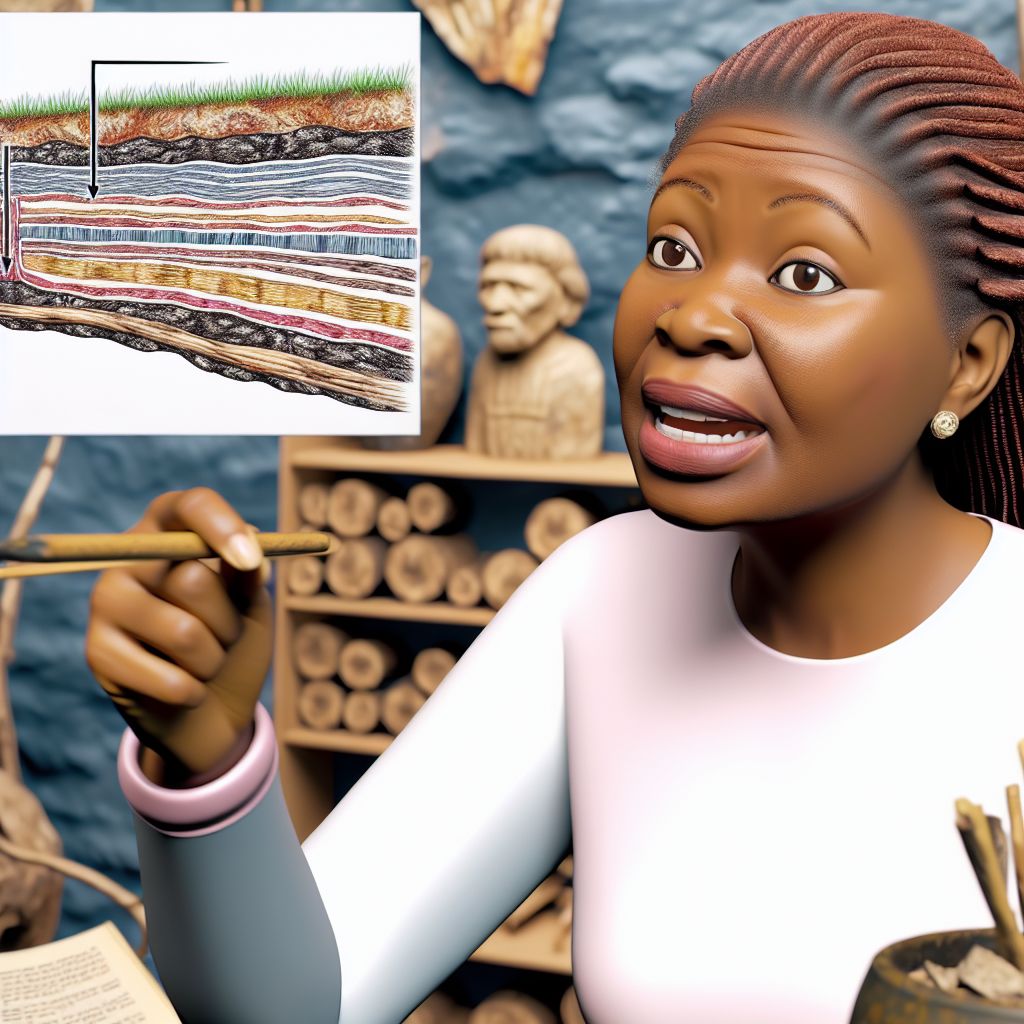Introduction
Archaeology is the study of human history and prehistory through the excavation of artifacts and other physical remains.
Brief Overview of Archaeology and its Significance in Education
It helps us understand the past, make connections to the present, and plan for the future.
Archaeology in education provides students with a hands-on learning experience.
Importance of Archaeology in Nigerian Education
In Nigeria, archaeology plays a crucial role in preserving the country’s rich cultural heritage.
It helps to educate students about their history, traditions, and cultural practices.
Archaeology also promotes national pride and identity among Nigerian students.
It encourages critical thinking and problem-solving skills, essential for future success.
By integrating archaeology into the education system, Nigeria ensures the preservation of its heritage.
It fosters a sense of community and unity among students, regardless of their cultural backgrounds.
Archaeology plays a crucial role in preserving Nigeria’s rich cultural heritage.
By studying artifacts, sites, and structures from the past, archaeologists can piece together the history of various Nigerian communities and civilizations.
This helps ensure that these cultural treasures are not lost to time.
The Importance of Understanding the Past for Future Generations
By studying the past through archaeology, we can gain valuable insights into the way of life, belief systems, customs, and traditions of our ancestors.
This knowledge can help us appreciate and preserve our cultural identity as Nigerians.
It also enables us to learn from the mistakes and successes of the past, shaping a better future for generations to come.
Benefits of Archaeology in Preserving Cultural Heritage
- Archaeology helps us understand the evolution of Nigerian societies over time.
- It sheds light on the origins of different cultural practices and traditions in Nigeria.
- By preserving and studying artifacts, we can ensure the continuity of our cultural legacy.
- Archaeological discoveries foster a sense of national pride and identity among Nigerians.
- Understanding our cultural heritage through archaeology promotes unity and social cohesion.
Challenges and Solutions in Preserving Nigeria’s Cultural Heritage
- One of the major challenges facing the preservation of Nigeria’s cultural heritage is looting and illegal excavation of archaeological sites.
- To address this issue, strict laws and regulations should be enforced to protect archaeological sites and artifacts.
- Public awareness and education programs could also help raise awareness about the importance of preserving cultural heritage.
- Collaboration with international organizations and experts can provide resources and expertise to safeguard Nigeria’s cultural treasures.
- Investment in research and technology can enhance our understanding of Nigeria’s cultural heritage and improve preservation efforts.
Significance of Archaeological Efforts in Nigerian Society
In summary, archaeology plays a key role in preserving Nigeria’s rich cultural heritage.
Studying the past helps us gain a deeper appreciation of our roots, traditions, and history as Nigerians.
It is essential to recognize the value of our cultural heritage and take proactive measures to protect and preserve it for future generations.
Uncovering Historical Insights
Archaeology helps uncover historical insights about Nigeria by studying artifacts and structures.
Learning from the past allows us to make informed decisions in the present.
By understanding our past through archaeology, we can gain a better perspective on our present circumstances.
Archaeological findings provide evidence of past civilizations, trade routes, and cultural practices in Nigeria.
Studying the past through archaeology enables us to appreciate our cultural heritage and traditions.
Archaeological research helps us understand how societies in Nigeria evolved over time.
It gives us a glimpse into the daily lives, beliefs, and practices of people who lived in Nigeria centuries ago.
Through archaeology, we can trace the roots of modern Nigerian society and understand its complexities.
This knowledge helps us appreciate the diversity and richness of Nigeria’s cultural history.
Archaeologists uncover buried treasures that reveal ancient customs, technologies, and societal structures.
- Archaeology helps uncover historical insights about Nigeria by studying artifacts and structures.
- Learning from the past allows us to make informed decisions in the present.
- By understanding our past through archaeology, we can gain a better perspective on our present circumstances.
- Archaeological findings provide evidence of past civilizations, trade routes, and cultural practices in Nigeria.
- Studying the past through archaeology enables us to appreciate our cultural heritage and traditions.
- Archaeological research helps us understand how societies in Nigeria evolved over time.
- It gives us a glimpse into the daily lives, beliefs, and practices of people who lived in Nigeria centuries ago.
- Through archaeology, we can trace the roots of modern Nigerian society and understand its complexities.
- This knowledge helps us appreciate the diversity and richness of Nigeria’s cultural history.
- Archaeologists uncover buried treasures that reveal ancient customs, technologies, and societal structures.
Learn More: Studying Applied Zoology: Requirements and Admissions
Enhancing Critical Thinking Skills
Studying archaeology is a valuable way to enhance critical thinking skills.
It involves analyzing and interpreting archaeological findings in a logical manner.
By engaging in this process, students can develop the following skills:
- Analytical Thinking: Archaeology requires students to critically assess data and evidence to draw meaningful conclusions.
- Problem-Solving Abilities: Students learn how to address complex challenges and find solutions based on archaeological evidence.
- Logical Reasoning: The study of archaeology teaches students how to make sound arguments and draw logical inferences from findings.
- Attention to Detail: Archaeology demands a meticulous approach to examining artifacts and understanding their significance.
- Research Skills: Students develop research competencies as they investigate archaeological sites and sources to gather information.
Furthermore, analyzing and interpreting archaeological findings in a logical manner is crucial for several reasons:
- Accurate Reconstruction: Proper analysis ensures accurate reconstruction of past civilizations and cultures.
- Avoiding Misinterpretations: Logical interpretation helps prevent misrepresentations of historical events and artifacts.
- Establishing Credibility: Sound reasoning in archaeology enhances the credibility of research outcomes and academic conclusions.
- Enhancing Understanding: Logical analysis allows for a deeper understanding of the past and its impact on present societies.
- Promoting Critical Inquiry: Encouraging logical interpretation fosters a culture of critical inquiry and intellectual curiosity among students.
The study of archaeology not only enhances critical thinking skills but also underscores the importance of analyzing and interpreting archaeological findings in a logical manner.
See Related Content: Funding Opportunities for Applied Biology Research
Contribution to Tourism and Economy
Archaeological sites in Nigeria are major tourist attractions that draw visitors from all over the world.
These sites offer a glimpse into ancient civilizations and showcase the rich cultural heritage of the country.
Tourists are fascinated by the artifacts and structures found at these sites, sparking interest in the history of Nigeria.
Visitors often spend money on accommodations, transportation, food, and souvenirs, boosting the local economy.
Preserving archaeological sites is crucial for both cultural and economic reasons.
Transform Your Career with Expert Guidance
Get personalized mentorship consulting that’s tailored to your unique path. Our expert advice is actionable and exclusive.
Get StartedBy protecting these sites, we safeguard our cultural identity and heritage for future generations to appreciate.
Well-preserved sites can continue to attract tourists, generating revenue and creating job opportunities for locals.
Tourism plays a significant role in Nigeria’s economy, and archaeological sites contribute to this sector’s growth.
Investing in the preservation and promotion of archaeological sites in Nigeria is essential for cultural sustainability and economic development.
Gain More Insights: Geology Degree: Curriculum and Specializations in Nigeria

Promoting National Identity
Archaeology plays a vital role in promoting a sense of national identity in Nigeria through various aspects.
- Preservation of Cultural Heritage: Archaeological findings help in preserving the rich cultural heritage of Nigeria, which contributes to a strong national identity.
- Connecting to Our Ancestors: Understanding Nigeria’s archaeological heritage allows people to connect with their ancestors and roots, fostering a sense of belonging and pride in the nation’s history.
- Building National Pride: By exploring and learning about the country’s archaeological sites and artifacts, individuals develop a sense of pride in Nigeria’s past achievements and cultural diversity.
- Unity Among Different Ethnic Groups: Archaeology helps in showcasing the commonalities and shared history among Nigeria’s diverse ethnic groups, promoting unity and a shared national identity.
- Preserving National Identity for Future Generations: Studying and preserving Nigeria’s archaeological heritage ensures that future generations have a strong sense of national identity and cultural pride.
Understanding Nigeria’s archaeological heritage is crucial in shaping national pride for several reasons.
- Connecting Past to Present: By studying archaeological sites and artifacts, Nigerians can understand how past civilizations have contributed to shaping the country’s present identity.
- Promoting Cultural Appreciation: Archaeology helps in appreciating the diverse cultures and traditions that have existed in Nigeria over centuries, fostering a sense of respect and pride in the nation’s heritage.
- Highlighting Achievements and Contributions: Exploring archaeological findings showcases Nigeria’s past achievements in various fields, highlighting the contributions of its ancestors to the nation’s development.
- Fostering a Sense of Belonging: Understanding Nigeria’s archaeological heritage gives individuals a sense of belonging to a rich and historically significant nation, strengthening their connection to the country.
- Creating a Shared Narrative: Archaeology provides a platform for Nigerians to create a shared narrative based on their common history, which promotes national unity and solidarity.
Explore Further: Challenges Facing Agri-Science Students in Nigeria
Studying archaeology plays a crucial role in bridging the gap between theoretical knowledge and practical applications.
Here is why:
Hands-on Experience
- Engaging in archaeological fieldwork provides students with hands-on experience.
- Students learn how to excavate, record findings, analyze artifacts, and interpret data.
- Practical experience enhances understanding of archaeological principles and methods.
- Fieldwork allows students to see the direct application of theoretical concepts.
- Excavating artifacts helps students develop critical thinking and problem-solving skills.
Developing Skills
- Archaeological fieldwork enhances students’ teamwork and collaboration skills.
- Students learn to communicate effectively with team members and researchers.
- Hands-on experience helps students develop leadership and decision-making abilities.
- Fieldwork encourages students to be detail-oriented and methodical in their approach.
- Engaging in excavation projects strengthens students’ organizational and time management skills.
Real-World Applications
- Practical experience in archaeology prepares students for careers in research, heritage management, and academia.
- Fieldwork equips students with the skills needed to work in cultural resource management and museums.
- Understanding practical applications of theoretical knowledge enhances students’ employability and career prospects.
- Hands-on experience in archaeology allows students to contribute meaningfully to research and preservation efforts.
- Fieldwork experience provides students with a deeper appreciation for cultural heritage and history.
Studying archaeology not only enriches students’ academic knowledge but also prepares them for real-world applications.
Bridging the gap between theory and practice through hands-on fieldwork is essential for a comprehensive education in archaeology.
Importance of Archaeology in Nigerian Education
Archaeology plays a vital role in Nigerian education by connecting students to their rich cultural heritage and history.
Integrating archaeology into the curriculum provides a holistic educational experience that goes beyond textbooks.
It allows students to engage in hands-on learning experiences, critical thinking, and problem-solving skills.
By understanding the significance of archaeology, students can develop a deeper appreciation for their roots and cultural identity.
Thus, it is crucial to emphasize the importance of integrating archaeology into the educational system.
This integration ensures a well-rounded and comprehensive learning experience for Nigerian students.
Additional Resources
Male Head, Nok culture | Negus Rudison-Imhotep, Ph.D.




